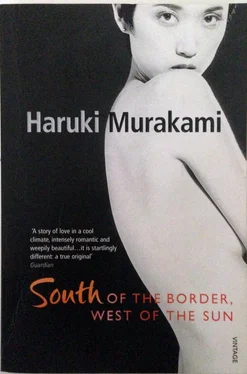“I like your body just the way it is,” I told her. “You’re fine the way you are—no need to work out or go on diets. It’s not like you’re fat or anything.” Which wasn’t a lie. I really did like the softness of her body with its bit of extra flesh. I loved to rub her naked back.
“You just don’t get it,” she said, shaking her head. “You say it’s okay for me to look the way I am now, but it takes every ounce of energy I have just to stay in the same place.”
An outsider would probably have said we had an ideal life. Certainly I was convinced of it at times. I was fired up about my work and was taking in a good deal of money. I owned a four-bedroom condo in Aoyama, a small cottage in the mountains of Hakone, a BMW, a Jeep Cherokee. And I had a happy family. I loved my wife and my two daughters. What more could anyone ask for? If, say, Yukiko and the kids had begged me to tell them what they should do to be even better to me, to be loved even more, there was nothing I could have said. I could not imagine a happier life.
But since Shimamoto had stopped coming to see me, I was stuck on the airless surface of the moon. If she was gone forever, no one remained to whom I could reveal my true feelings. On sleepless nights I’d lie in bed and replay over and over in my mind that scene at the snowy Komatsu Airport. Recall it enough times, and the memories would start to fade. Or so I thought. The more I remembered, the stronger the memories became. The word “Delayed” flashing on the flight information board; outside the window, the snow coming down hard. You couldn’t see more than fifty yards. On the bench, Shimamoto sat still, hugging herself tight. Her navy pea coat and muffler. Her body with its mixed scent of tears and sadness. I could smell that scent. Beside me, in bed, my wife breathed quietly, asleep. She knows nothing. I closed my eyes and shook my head. She knows nothing .
The abandoned bowling alley parking lot, my melting snow in my mouth and feeding it to her. Shimamoto in the airplane, in my arms. Her closed eyes, the sigh from her slightly parted lips. Her body, soft and limp. She wanted me then. Her heart was open to me. Yet I held myself back, back on the surface of the moon, stuck in this lifeless world. And in the end she left me, and my life was lost all over again.
Sometimes I’d wake up at two or three in the morning and not be able to fall asleep again. I’d get out of bed, go to the kitchen, and pour myself a whiskey. Glass in hand, I’d look down at the darkened cemetery across the way and the headlights of the cars on the road. The moments of time linking night and dawn were long and dark. If I could cry, it might make things easier. But what would I cry over? Who would I cry for? I was too self-centered to cry for other people, too old to cry for myself.
Autumn finally arrived. And when it did, I came to a decision. Something had to give: I couldn’t keep on living like this.
In the morning after dropping off my daughters at nursery school, I went to the pool and swam my usual two thousand meters. I imagined I was a fish. Just a fish, with no need to think, not even about swimming. Next I showered, changed into a T-shirt and shorts, and started pumping iron.
Then I headed to the one-room flat I used as an office and set to checking the account books, figuring my employees’ pay, working on the plan for remodeling the Robin’s Nest the following February. At one, as usual, I went home and had lunch with my wife.
“Honey, I had a call from my father this morning,” Yukiko said. “Busy as always. He said there’s this stock that’ll go through the roof, and we should buy as much as we could manage. Not your run-of-the-mill stock tip, he said, but something extra special.”
“If it’s going to earn that much, he shouldn’t tell us about it but should keep it to himself. Wonder why he didn’t.”
“He said this was his personal way of saying thanks to you. He said you’d understand what he meant. Do you? He’s letting us have his share, you see. He said to invest all the money we have and not to worry, because this stock was hot. If somehow it didn’t turn a profit, he’d make sure we didn’t lose a penny.”
I rested my fork on my plate of pasta. “Anything else?”
“Well, he said we had to move quickly, so I called the bank and had them close out our savings accounts and send the money to Mr. Nakayama at the investment firm. So he could buy the stock. I was only able to scrape together about eight million yen. Maybe I should have bought even more?”
I drank some water. And tried to find the right words. “Before you did all that, why didn’t you ask me?”
“Ask you?” she said, surprised. “But you always buy the stocks my father tells you to. You’ve had me do it any number of times, haven’t you? You always tell me to just go ahead and do what I think is right. So that’s what I did. My father said there wasn’t a minute to lose. You were at the pool and I couldn’t get in touch with you. So what’s the problem?”
“It’s all right,” I said. “But I want you to sell all the stock.”
“Sell it?” She screwed up her eyes as if blinded by a glaring light.
“Sell all the stock you bought and put the money back in our savings accounts.”
“But if I do that we’ll have to pay a lot in transaction fees.”
“I don’t care,” I said. “Just pay it. I don’t care if we end up losing. Just sell everything you bought today.”
Yukiko sighed. “What happened between you and Father? What’s going on?”
I didn’t answer.
“What happened?”
“Listen, Yukiko,” I began, “I’m getting sick of all this. I don’t want to earn money in the stock market. I want to earn money by working with my own hands. I’ve done a good job up till now. You haven’t wanted for money, have you?”
“I know you’ve done a good job, and I haven’t complained once. I’m grateful to you, and you know I respect you. But still, my father’s doing this to help us out. Don’t you understand that?”
“I understand. Yukiko, do you know what insider trading is? Do you know what it means when somebody tells you there’s a one hundred percent chance you’ll turn a profit?”
“No.”
“It’s called stock manipulation,” I said. “Somebody inside a company manipulates the stock to rack up an artificial profit, then he and his pals split up the proceeds. And that money makes its way into politicians’ pockets or ends up as corporate bribes. This isn’t like the kind of stock your father urged me to buy before. That kind of stock probably was going to make a profit. That was just welcome information, nothing more. And most of the time the stock did go up, but not every time. This time is different. This stinks. And I don’t want to have anything to do with it.”
Fork in hand, Yukiko was lost in thought.
“How can you be sure this is a case of stock manipulation?”
“If you really want to know that, ask your father,” I said. “But I can tell you this: stock that’s guaranteed not to go down can only result from illegal deals. My father worked in an investment firm for forty years. Worked hard from morning to night. But all he left behind was a crummy little house. Maybe he just wasn’t good at it. Every night, my mother was hunched over the household account books, worried over a hundred or two hundred yen that didn’t balance. That’s the kind of family I was raised in. You said you can only come up with eight million yen. Yukiko, we’re talking about real money here, not Monopoly money. Most people ride to work every day, smashed together in packed trains, put in overtime, knock themselves out, and still couldn’t come near making that much in a year. I lived that kind of life for eight years, so I know. And there was no way I could make eight million yen. But you probably can’t picture that kind of life.”
Читать дальше












